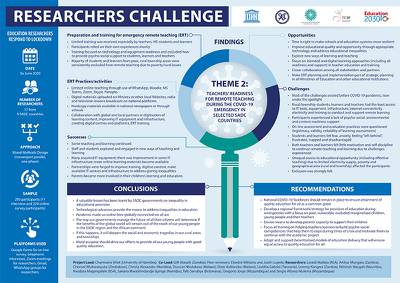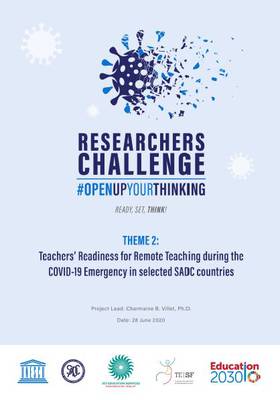Theme 2: Teacher preparation for distance learning during major disruptions
Thematic lead:Charmaine Villet
Co-lead: Gift Masaiti
Peer Reviewer: Dierdre Willaims Open Society Foundations (OSF), Justin Lupele (Zambia)
Lead Organisation: University of Namibia (UNAM)
Background
The coronavirus pandemic continues to spread rapidly across the globe with the number of confirmed cases globally surpassing 4 million people as of May 10, 2020. While the pandemic has reached virtually every country in the world, the crisis is only just beginning to unfold in vulnerable developing contexts, including those in Southern Africa. The health and economic effects of the pandemic have been most palpable and responses in these sectors have pre-occupied governments. The immediacy of these health and economic impacts has caused some overshadowing of other more critical impacts of the COVID-19, including the impact on learners and education systems globally. The disruptions to education have been quite dramatic and the serious and detrimental long-term effects are still not fully known. As at May 10, 2020, UNESCO estimates show that COVID-19 has affected some 1,268,164,088 learners (i.e. 72.4% of total enrolled learners globally), with 177 countrywide school closures. Of this total, almost 62 million account for the learners affected in the SADC region.
In order to redress this imbalance, short- and medium-term solutions need to be developed and implemented, not just for this specific instance of disruption caused by the pandemic but also for future events that cause similar types of disruptions, such as climate-related disruptions. This moment presents the opportunity for us to rethink and reimagine systems so that they become more resilient and can more readily adapt to future shocks and disruptions. Since teachers are at the centre of learning, one critical need in building system readiness and resilience is taking steps to prepare and support them for the transition that must occur during moments of disruption. When schools close, especially unexpectedly and for unknown durations, teachers often are not given the support necessary to continue their obligations. Transitions to distance learning platforms tend to be uneven. Many teachers are unable to reach their students due to limited connectivity or put their health at risk to distribute learning materials to their students.
Download the final report and infographic
Key Research Questions/Objectives
This theme will explore teachers’ preparedness to continue supporting learning during major disruptions using a range of distance learning approaches, including but not limited to ICTs. This research will recognize that the extraordinary demands placed on teachers during moments of disruption include helping parents support students, attending to the social and emotional wellbeing of students as well as their health, safety, and nutrition needs.



